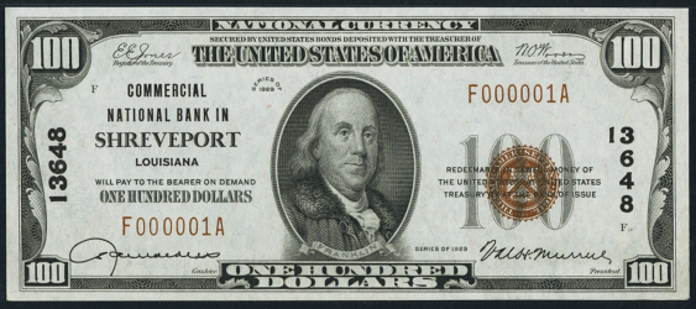One Hundred Dollar Notes › Nationals › 1929 One Hundred Dollar National Bank Notes › Wisconsin Charters › 1929 $100 Richland Center Wisconsin First National Bank
Get Value Now
| Item | Info |
|---|---|
| Series | 1929 |
| Charter | #7901 First National Bank of Richland Center, Wisconsin |
| Year Chartered | 1905, 486 Banks Chartered |
| City Info | Richland Center is a city in Richland County, Wisconsin, United States, which also serves as the county seat. The population was 5,184 at the 2010 census. Richland Center was founded in 1851 by Ira Sherwin Hazeltine, a native of Andover, Vermont. Hazeltine was drawn to the site because of its abundant water power, fertile prairies, and its proximity to the geographical center of Richland County. Haseltine offered to donate land to the county if Richland Center was voted the county seat. In 1852 the Wisconsin Legislature formally declared Richland Center as the seat of justice for Richland County. The present Richland County courthouse was built at Richland Center in 1889. Source: Wikipedia |
| Similar Cities | City name is unique, no others like it. |
| Seal Varieties | Small Brown |
| See Also | If your note doesn't match try: 1. 1929 $100 Federal Reserve Bank Note 2. 1928 $100 Federal Reserve Note 3. 1928A $100 Federal Reserve Note 4. 1934 $100 Federal Reserve Note 5. 1934A $100 Federal Reserve Note 6. 1934B $100 Federal Reserve Note |
| Other Info | 1. Value depends on notes known for charter, condition and market demand. |
| Neat Fact | Check your note's serial number. Serial #1 notes are valuable, even on common charters. Serial numbers 2-4 are also desirable in some cases. |
No Obligations Offers and Appraisals
Please submit a good photo or scan. It will be identified and evaluated. Understand there may be subtle differences between the image you see above and your note. Signatures, design, markings and note condition will determine the offer price. Notes in Uncirculated or better condition receive the best offers.
Appraisals can be estimated for wholesale and retail prices. Wholesale is what dealers typically pay. Retail is what a collector might pay. Retail is slightly higher in most cases.
Please visit this page for USA Paper Money Reference. Do not treat this page as a reference guide, it is for appraisal and acquisition purposes only.
